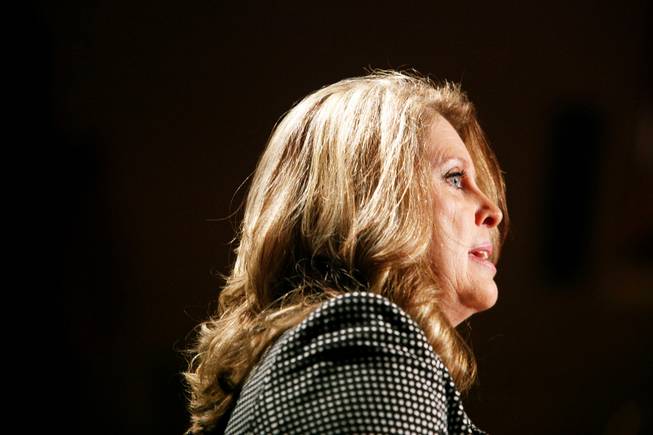
North Las Vegas Mayor Shari Buck speaks during the North Las Vegas State of the City address at Texas Station on Thursday, Jan. 12, 2012.
Wednesday, Jan. 18, 2012 | 6:26 p.m.
CARSON CITY — The state ethics commission found today that North Las Vegas Mayor Shari Buck acted on flawed legal advice when she gave only a vague disclosure of her husband’s interest in a City Council campaign and then tried to influence the outcome of the election.
The commission said she did not “willfully” violate ethics laws, a key finding that eliminates the potential for sanctions. Commission members said she was acting on the advice of then-Deputy City Attorney Jeffrey Barr.
But the commission will move forward with ethics allegations — that Buck did not adequately disclose her husband’s employment and improperly tried to influence her City Council colleagues in the contested election.
The 4-2 vote by the Nevada Commission on Ethics was a partial victory for Buck, a Republican.
But some members of the commission were skeptical that she adequately disclosed her conflict — Buck’s husband worked as a paid consultant to Wade Wagner in his one-vote victory over incumbent Councilman Richard Cherchio.
Other ethics commissioners said that her warning at a City Council meeting about holding another election nstead of certifying the results in favor of Wagner, did indeed constitute advocacy, instead of being merely a factual statement, as Buck’s attorney claimed on Wednesday.
Wagner beat Cherchio in the June 7 election. Cherchio is challenging the results in court.
The council was scheduled at a June 15 meeting to vote on certifying the election results, but instead decided to hold a new election.
Buck disclosed that a family member worked for a campaign, and recused herself from the vote. When a judge later found that the meeting was not properly noticed for a new election, the City Council rescheduled for a June 30 meeting. This time Buck did not disclose again, and chose to refer back to the earlier meeting. She then warned, “I have grave concerns that the direction this council has chosen to go in is not only wrong but is illegal.”
Her attorney, Mark Hutchison, said Wednesday both in the disclosure and in speaking her mind she had asked for advice from Barr. Then the deputy city attorney, Barr was appointed acting city attorney in July.
“Sometimes attorneys give bad advice,” said Buck’s attorney, Mark Hutchison. “In the private sector they could be sued for malpractice. In the public sector, you fire them, find someone competent.”
The city of North Las Vegas, and Barr, declined to comment for this story.
Commissioner Keith Weaver said he didn’t see an issue with Buck’s disclosure of the potential conflict of interest.
Whether she advocated for the issue after she disclosed the conflict “does give me heartburn.”
But, he said, Buck sought her attorney’s advice, even if he disagreed with it.
Prior ethics opinions have found that that disclosing conflicts and then not voting is not adequate. Public officials should refrain from trying to influence debates in such situations.
Hutchison, Buck’s attorney, said state ethics law offers generous “safe harbor” provisions for elected officials — arguing, in effect, that public officials have latitude to act as long as they ask the ethics commission or their attorney if what they are doing is OK.
The state law requires public officials to ask the Nevada Commission on Ethics for an opinion. Buck did not do that because she did not believe she had time, Hutchison said.
In referring to the earlier meeting, some commission members seemed distressed that Buck’s disclosure did not mention which campaign her family member worked for.
Commission Chairman Erik Beyer compared it to advice he received over the years that you could drive 83 mph between Las Vegas and Mesquite without getting a ticket.
“A tough highway patrolman would look at you, and say, ‘Sorry buddy. You should’ve known. The signs say 75 mph.’ These ethics laws are the signs,” he said. “Just because someone gives advice, you have an obligation to err on the side of caution.”
Hutchison countered that the state ethics laws does allow attorneys to tell public officials “what the speed limit is.”

Join the Discussion:
Check this out for a full explanation of our conversion to the LiveFyre commenting system and instructions on how to sign up for an account.
Full comments policy